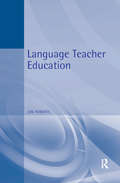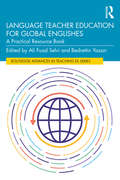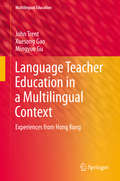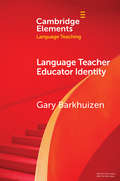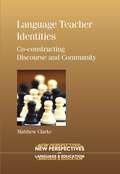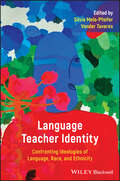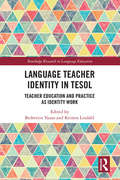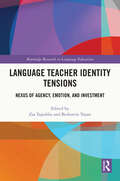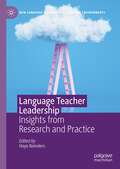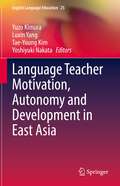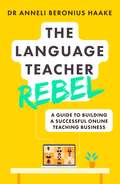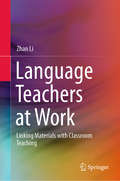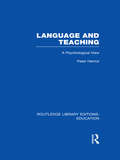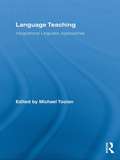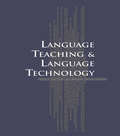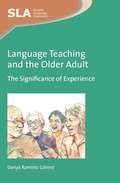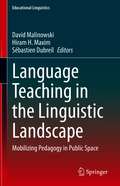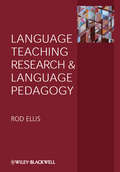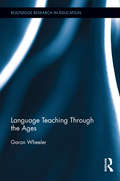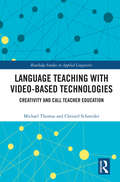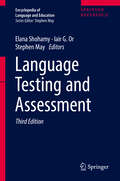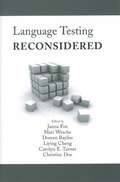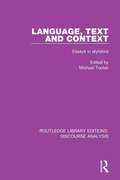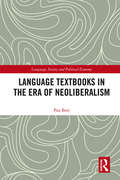- Table View
- List View
Language Teacher Education: The Reflective Trainer (A\hodder Arnold Publication)
by Jon Roberts'Language Teacher Education' is an introduction to language teacher training and development for teachers and providers in pre-service and in-service programmes. The text outlines the main theories of human learning and applies them to teacher education. Based on a broadly social constructivist perspective, it suggests a framework for planning pre-service and in-service programmes, and is illustrated both with case studies from a range of training situations around the world and appendices containing teacher education materials. Language Teacher Education is intended to inform readers' practical decisions and to help them build their own theories of teacher learning.
Language Teacher Education for Global Englishes: A Practical Resource Book (Routledge Advances in Teaching English as an International Language Series)
by Ali Fuad SelviThis practical resource book showcases both the theory and practical application for teacher educators in diverse contexts bringing a global Englishes perspective into their teacher education courses, both at pre- and in-service levels. The recent Global Englishes paradigm serves as a promising response to the complexity of identity, interaction, use, and instruction surrounding the English language. It is increasingly important to enhance teachers’ knowledge base—their specialized knowledge, skills, competencies, and commitments—vis-à-vis the changing needs of English Language Teaching. The chapters in the book provide accessible theoretical orientation to different aspects of the Global Englishes paradigm, from instructional materials to language assessment, and are complemented by a range of practical applications that promote teacher development. The volume is recommended as a viable professional development resource for teacher educators who are looking for activities and resources in preparing teachers for diverse teaching contexts, realities, affordances, and constraints.
Language Teacher Education in a Multilingual Context
by John Trent Xuesong Gao Mingyue GuThis book provides a multifaceted, multilayered examination of the processes and challenges language teachers face in constructing their professional identities in multilingual contexts such as Hong Kong. It focuses on how professional and personal identities are enacted as individuals cross geographic, educational, and socio-cultural boundaries to become English language teachers in Hong Kong. It explores the construction of language teachers' professional identities from multiple perspectives in multiple settings, including pre-service and in-service teachers from Hong Kong, Mainland China, and Western countries. Understanding the difficulties and challenges these language teachers face in their identity and professional development is of relevance to teachers and teacher educators, as well as those interested in becoming language teachers in multilingual contexts.
Language Teacher Educator Identity (Elements in Language Teaching)
by Gary BarkhuizenThe author examines who language teacher educators are in the field of language teaching and learning. This includes a description of the different types of language teacher educators working in a range of professional and institutional contexts, an analysis of the reflections of a group of experienced English teacher educators working in Colombia and enrolled in a doctoral program to continue their professional development, and an exposition of the work that language teacher educators do, particularly in the domains of pedagogy, research, and service and leadership (institutional and community). All of this is done with the aim of understanding the identities that language teacher educators negotiate and are ascribed in their working contexts. The author emphasizes the need for research to pay attention to the lives and work of language teacher educators, and offers forty research questions as an indication of possible future research directions.
Language Teacher Identities
by Matthew ClarkeSet in the rapidly changing world of the contemporary United Arab Emirates and bringing together detailed linguistic analysis with cutting edge social theory, this book explores the development of the first cohort of students to complete a new Bachelor of Education in English language teaching, theorizing the students' learning to teach in terms of the discursive construction of a teaching identity within an evolving community of practice. Both a study of the influence of issues such as gender and nationalism in language teacher education in the Middle East, as well as of the power of discourse and community in shaping identity, this book will be of relevance to anyone working in teacher education as well as to those with an interest in theorizations of discourse and identity.
Language Teacher Identity: Confronting Ideologies of Language, Race, and Ethnicity
by Sílvia Melo‐Pfeifer Vander TavaresThe first volume to focus on race, ethnicity, and accent as elements of language teacher identity, a valuable guide for in-service teachers and teachers-in-training Language Teacher Identity presents a groundbreaking critical examination of how ideologies of race, ethnicity, accent, and immigration status impact perceptions of plurilingual teachers. Bringing together contributions by an international panel of established and emerging scholars, this important work of scholarship addresses issues related to native-speakerism, monolingualism, racism, competence, authenticity, and legitimacy while examining their role in the construction of professional identity. With an intersectional and holistic approach, the authors draw upon case studies of practical teacher experiences from Brazil, Canada, Germany, Norway, Mongolia, Pakistan, and the United States to provide teachers with real-world insights on responding to the assumptions, biases, and prejudices that students, student teachers, and teachers may bring into the classroom. Topics include the impact of policies and ideologies on teacher identity development, the intersection between L2 teacher identity and teacher emotion research, awareness of ethnic accent bullying, and the use of transraciolinguistic approaches in the classroom. This unique new work: Provides a broad overview of the different types of challenges language teachers face in their careers Focuses on race, ethnicity, plurilingualism, and accent as fundamental elements of a language teacher’s identity Discusses the sensitive political and social factors that complicate the role of a language teacher in the classroom Covers the teaching of a wide range of languages, including English, Japanese, Portuguese, French, Spanish, and Norwegian Addresses key issues and significant gaps in contemporary research on language teacher education, including the experiences of teachers of two or more languagesEmploying a variety of methodological and theoretical approaches, Language Teacher Identity is a forward-looking look at an exciting area of research and theory in language teacher education and training. It is essential reading for students training to become language teachers, in-service teachers, and for students and scholars in applied linguistics with a focus on TESOL, teacher and language education.
Language Teacher Identity in TESOL: Teacher Education and Practice as Identity Work (Routledge Research in Language Education)
by Bedrettin Yazan Kristen LindahlThis volume draws on empirical evidence to explore the interplay between language teacher identity (LTI) and professional learning and instruction in the field of TESOL. In doing so, it makes a unique contribution to the field of language teacher education. By reconceptualizing teacher education, teaching, and ongoing teacher learning as a continuous, context-bound process of identity work, Language Teacher Identity in TESOL discusses how teacher identity serves as a framework for classroom practice, professional, and personal growth. Divided into five sections, the text explores key themes including narratives and writing; multimodal spaces; race, ethnicity, and language; teacher emotions; and teacher educator-researcher practices. The 15 chapters offer insight into the experiences of preservice teachers, in-service teachers, and teacher educators in global TESOL contexts including Canada, Japan, Korea, Norway, Sri Lanka, Turkey, the United Kingdom, and the United States. This text will be an ideal resource for researchers, academics, and scholars interested in furthering their knowledge of concepts grounding LTI, as well as teachers and teacher educators seeking to implement identity-oriented approaches in their own pedagogical practices.
Language Teacher Identity Tensions: Nexus of Agency, Emotion, and Investment (Routledge Research in Language Education)
by Zia Tajeddin Bedrettin YazanAddressing the critical issue of teacher identity tensions, this edited volume looks at the tensions between teachers’ instructional beliefs, values, and priorities, and the contextual constraints and requirements. It examines how teachers deal with these tensions to avoid demotivation and burnout, which play a significant role in identity construction. Tensions are inseparable from growth and transformation but have the potential to disrupt teacher identity construction. Therefore, continual efforts to resolve tensions in teaching are inevitable. The process of resolution or reconciliation might be extended, and teachers could need support in that process to minimize the possible negative impacts on their identities. This process can simultaneously generate positive outcomes for teachers’ growth and learning. Therefore, how teachers perceive, respond to, and grapple with tensions are critical experiences that offer windows into the complexities of teacher identity negotiation.The volume paints a picture of the personal, professional, and political dimensions of teacher identity tensions in various international contexts. The chapters draw on empirical studies with clear pedagogical implications to illustrate what identity tensions language teachers face in and outside the classroom during their career trajectory, how language teachers cope with identity tensions in their professional life, and how teacher educators can integrate identity tensions into teacher learning activities.This book is beneficial for students and lecturers in applied linguistics, educational linguistics, and educational psychology. It will also be helpful of interest to teacher educators, teacher education researchers, teacher supervisors, and MA and doctoral students interested in research on language teacher identity.
Language Teacher Leadership: Insights from Research and Practice (New Language Learning and Teaching Environments)
by Hayo ReindersThis edited book brings together an international cast of contributors and chapters which recognise the complexity of teacher leadership and its situated and dynamic nature. Chapters in this book are research-driven, and each reports on findings from (teacher-led and otherwise) research, synthesising the current state-of-the-art in each area. Each chapter uses illustrations of relevant practices from which lessons can be drawn. The aim is to come to a broad understanding of what best practices have emerged over the years, and where gaps still remain. Each of the chapters contributes to our understanding of how the different elements that make up teacher leadership are interconnected, with the concluding chapter synthesising these into a framework of language teacher leadership. This book will be of interest to pre-service and in-service teachers in the context of a professional learning community, as well as students and scholars of Applied Linguistics, Language Teaching and Learning, and Teacher Education.
Language Teacher Motivation, Autonomy and Development in East Asia (English Language Education #25)
by Yuzo Kimura Luxin Yang Tae-Young Kim Yoshiyuki NakataThis volume highlights unique features of L2 teachers’ motivation, autonomy and career development in Far East counties (including Japan, South Korea and China), using diverse methodological research approaches incorporating both quantitative and qualitative paradigms. While much of current research focuses on students’ psychology, this volume looks into EFL teachers’ motivation and autonomy. Both discussions of theoretical issues of teacher motivation and autonomy and practical, classroom-based investigations are included and written to appeal to researchers, as well as applied teacher audiences. The theoretical chapters give readers a solid grounding in the issues of interest to the field. The practical chapters offer cutting edge insights and can also serve as templates on which postgraduate and postdoctoral researchers can base future studies. This helps the book to offer a dual service to the research community, addressing both issues of theorization of research and the practice of conducting research investigations.
The Language Teacher Rebel: A guide to building a successful online teaching business
by Anneli Beronius HaakeDo you want to start teaching a language online, be your own boss and be able to work from anywhere that has wifi? Do you want to make a difference in the world by using your language skills to empower people and give them the confidence they need to develop? This timely book covers everything needed to set up a successful online language teaching business, from creating the right mindset, tech and marketing, to designing products and services, finding students online, growing your business and more. More than a manual, it is also a rallying call for language teachers - or language teacher rebels - to share cultural values beyond the traditional classroom and encourage integration on a worldwide scale. An accompanying Language Teacher Rebel Toolkit, containing a comprehensive set of editable, effective and time-saving templates for all the essential documents needed to set up and run an online language teaching business, is available for sale at library.teachyourself.com. Including planners, email scripts and financial templates, this toolkit has everything you need to get organised and get teaching.
The Language Teacher Rebel: A guide to building a successful online teaching business
by Anneli Beronius HaakeDo you want to start teaching a language online, be your own boss and be able to work from anywhere that has wifi? Do you want to make a difference in the world by using your language skills to empower people and give them the confidence they need to develop? This timely book covers everything needed to set up a successful online language teaching business, from creating the right mindset, tech and marketing, to designing products and services, finding students online, growing your business and more. More than a manual, it is also a rallying call for language teachers - or language teacher rebels - to share cultural values beyond the traditional classroom and encourage integration on a worldwide scale. An accompanying Language Teacher Rebel Toolkit, containing a comprehensive set of editable, effective and time-saving templates for all the essential documents needed to set up and run an online language teaching business, is available for sale at library.teachyourself.com. Including planners, email scripts and financial templates, this toolkit has everything you need to get organised and get teaching.
Language Teachers at Work: Linking Materials with Classroom Teaching
by Zhan LiThis book examines a ubiquitous, yet under-researched, area of language education, i.e., language teachers' use of curriculum materials. It particularly focuses on EFL teachers' use of prescribed curriculum materials in higher education in Mainland China and presents a qualitative, multi-case study involving four Chinese EFL teachersand eight students (two students from each teacher’s class) at one university in Mainland China. Drawing on data from pre-lesson and post-lesson interviews with the teachers, lesson observations, and documents in three consecutive semesters at the target university, the book delineates the processes of materials useinclassroom settings. It also identifies four domains of factors that influenced the enactment of curriculum materials. Most importantly, by adopting Vygotsky’s (1978) mediation theory and Remillard’s (2005) participatory perspective, the book constructs a "curriculum enactment mediation model" to reveal the complex and mediated relations among teachers, learners, curriculum materials, and context. It also recommends practical implications for materials developers, teacher educators, administrators, and policymakers.
Language & Teaching: A Psychological View (Routledge Library Editions: Education)
by Peter HerriotLanguage is the basic means of communication in the classroom. It is therefore vital that teachers should know something about its acquisition, development, possible defects and the ways in which they may understand and develop its communicative powers. Peter Herriot describes the relationship with thinking, with personal and social development and its manifestations in the classroom. All this is described from the point of view of the psychologist and incorporates many of the findings of contemporaneous psychological research. But the author carefully avoids the jargon of psychology nor does he assume any prior knowledge of linguistics or psychology. Thus Language and Teaching should be especially useful to the student of education or those already engaged in teaching. It is a primer of communication.
Language Teaching: Integrational Linguistic Approaches (Routledge Advances in Communication and Linguistic Theory)
by Michael ToolanThis book demonstrates the relevance of an integrational linguistic perspective to a practical, real-world need, namely the learning of languages. Integrational linguistics’ shunning of both realist and structuralist theories of language, its commitment to an unwavering attention to the perspective of the language user, and its adherence to a semiology in which signs are the situated products of interactants interpretive behaviour, mean that it radically reconceptualizes language learning and language teaching. Detractors have implied that IL is so ‘philosophical’ or ‘theoretical’ an exercise that it has no useful bearing on the practical problems of language learning. These papers refute that misconception by demonstrating how an IL stance can help disentangle the conflicting considerations and contradictory assumptions that arise in a host of language teaching situations: first, second- and foreign-language classrooms in a diversity of settings (including India, Australia, the United States, and Hong Kong), with different age-groups of students, whether the focus is on speech or writing, and in more informal settings.
Language Teaching and Language Technology
by John Nerbonne Sake Jager Arthur Van EssenThis text assesses the importance of language technology to increasingly popular computer-assisted language learning work. The book contains writings on pronunciation, vocabulary, grammar, reading, writing, testing, distance learning and user studies.
Language Teaching and the Older Adult: The Significance of Experience
by Danya Ramírez GómezThe aging of the population and the increasing number of older adults pursuing foreign language courses call for a greater understanding of the ways in which these individuals learn foreign languages. This book offers a pioneering contribution to the literature on foreign language education for older adults (aged 60 and over), termed foreign language geragogy. It details an empirical, multidisciplinary study on Japanese older learners of Spanish and focuses on the influence of learning experiences on vocabulary learning strategy use. It discusses the constraints that preconceptions impose on learners, researchers, instructors and administrators, and it offers a set of practical recommendations for foreign language activities for elderly individuals. It also introduces the notion of 'learner re-training', an instructional mechanism that contributes to older learners' self-acknowledgment and autonomy development in foreign language learning. The book is directed at teachers and trainee teachers of foreign languages to older adults, and also at education professionals and researchers in the field of foreign language learning in general.
Language Teaching in the Linguistic Landscape: Mobilizing Pedagogy in Public Space (Educational Linguistics #49)
by David Malinowski Hiram H. Maxim Sébastien DubreilThis book builds upon the growing field of Linguistic Landscape in order to demonstrate the power of a spatialized approach to language, culture, and literacy education as it opens classrooms and cultivates new competencies. The chapters develop major themes, including re-imagining language curricula, language classrooms, and schoolscapes in dialogue with the heteroglossic discourses of the local; developing L2 learners’ symbolic, translingual competencies through engagement with situated, multimodal texts; fostering critical social awareness through language study in the linguistic landscape; expanding opportunities for situated L2 reading and writing; and cultivating language students’ capacities for engaged scholarship and research in out-of-class contexts.By exploring the pedagogical possibilities of place-based approaches to literacy development, this volume contributes to the reimagining of language education through the linguistic landscape.
Language Teaching Research and Language Pedagogy
by Rod EllisThis book examines current research centered on the second language classroom and the implications of this research for both the teaching and learning of foreign languages. It offers illuminating insights into the important relationship between research and teaching, and the inherent complexities of the teaching and learning of foreign languages in classroom settings. Offers an accessible overview of a range of research on instruction and learning in the L2 classroom Bridges the relationship between research, teachers, and learners Helps evolve the practice of dedicated current language teachers with research findings that suggest best practices for language teaching
Language Teaching Through the Ages (Routledge Research in Education #93)
by Garon WheelerKonrad Koerner, a leading historian of linguistics, has long said that an academic field cannot be considered to have matured until it has history as one of its subfields. The history of linguistics is a growing area, having come into its own in the 1960s, especially after Noam Chomsky looked for historical roots for his work. In contrast, the history of language teaching has been neglected, reflecting the insecurity and youth of the field. Most works on the subject have been written by linguists for other linguists, and typically focus on a specific period or aspect of history. This volume concentrates on the basic issues, events, and threads of the history of the field - from Mesopotamia to the present - showing how a knowledge of this history can inform the practice of language teaching in the present.
Language Teaching with Video-Based Technologies: Creativity and CALL Teacher Education (Routledge Studies in Applied Linguistics)
by Michael Thomas Christel SchneiderThis book explores the implications of technology-mediated project-based language learning for CALL teacher development, focusing on the role of video-based instruction in elucidating challenges and opportunities to promote learner creativity in the language classroom. The volume builds on existing literature on project-based language learning by extending the focus on the affordances of machinima, digital video created by teachers and learners to capture experience in 3D immersive games or virtual worlds. Drawing on data from a large-scale research project featuring case studies that examine different facets of CALL teacher education, the book calls attention to language learning and teaching strategies that encourage both learners and teachers to develop innovative approaches in the language classroom and how such approaches promote the integration of lifelong learning skills alongside traditional linguistic competencies. Offering a dynamic contribution to the growing literature on the interface of language learning and teaching and technology, this book will appeal to students and researchers in applied linguistics and language and education, as well as those interested in the latest developments in CALL.
Language Testing and Assessment
by Elana Shohamy Iair G. Or Stephen MayIn this third, fully revised edition, the 10 volume Encyclopedia of Language and Education offers the newest developments, including an entirely new volume of research and scholarly content, essential to the field of language teaching and learning in the age of globalization. In the selection of topics and contributors, the Encyclopedia reflects the depth of disciplinary knowledge, breadth of interdisciplinary perspective, and diversity of socio-geographic experience in the language and education field. Throughout, there is an inclusion of contributions from non-English speaking and non-western parts of the world, providing truly global coverage. Furthermore, the authors have sought to integrate these voices fully into the whole, rather than as special cases or international perspectives in separate sections. The Encyclopedia is a necessary reference set for every university and college library in the world that serves a faculty or school of education, as well as being highly relevant to the fields of applied and socio-linguistics. The publication of this work charts the further deepening and broadening of the field of language and education since the publication of the first edition of the Encyclopedia in 1997 and the second edition in 2008.
Language Testing Reconsidered (Actexpress)
by Janna Fox Mari Wesche Doreen BaylissLanguage Testing Reconsidered provides a critical update on major issues that have engaged the field of language testing since its inception. Anyone who is working in, studying or teaching language testing should have a copy of this book. The information, discussions, and reflections offered within the volume address major developments within the field over the past decades, enlivened by current "takes" on these issues. The real value of this collection, however, lies in its consideration of the past as a means of defining the future agenda of language testing.
Language, Text and Context: Essays in stylistics (RLE: Discourse Analysis)
by Michael ToolanFirst published in 1992, this wide-ranging collection of essays focuses on the principle of contextualisation as it applies to the interpretation, description, theorising and reading of literary and non-literary texts. The collection aims to reveal the interdependencies between theory, analysis, text and context by challenging the myth that stylistics entails a fundamental separation of text from context, linguistic description from descriptive interpretation, or language from situation. The essays cover a historically diverse set of texts, from Puttenham to Colemanballs, and a number of language-sensitive topics such as post-modernism, irony, newspaper representations, gender and narrative.
Language Textbooks in the era of Neoliberalism (Language, Society and Political Economy)
by Pau BoriThis book examines how neoliberalism finds expression in foreign language textbooks. Moving beyond the usual focus on English, Pau Bori explores the impact of neoliberal ideology on Catalan textbooks. By comparing Catalan textbooks to English textbooks, this book interrogates the similarities and differences between a minor and a global language in the age of neoliberalism. Drawing on insights from critical theory and critical pedagogy, this study provides a fresh perspective on foreign language textbooks and second language education more broadly. Language Textbooks in the Era of Neoliberalism paves the way for new critical perspectives in language education that will challenge the current hegemony of neoliberalism.
